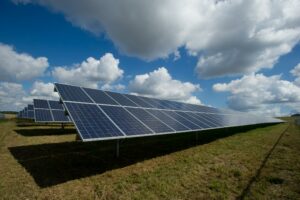
If you received our recent newsletter, you know that the Inflation Reduction Act was recently signed into law by President Biden, and there are a number of interesting tax credits that are worth learning more about. <Insert self-promotion here: If you don’t get our newsletter, feel free to sign-up here!>
While the newsletter was a very brief overview, here I’ll jump into some more of the nitty gritty. So with that being said, let’s take a look at these interesting tax credits, all of which revolve around energy efficient home improvements and/or electric vehicles (EVs).
Energy Efficient Home Improvements
- Renamed and revised an existing tax credit for energy efficient home improvements such as exterior doors, windows, insulation, heat pumps, HVAC units, water heaters, furnaces, boilers, home energy audits and a few other items
- Changed the maximum credit from $500 per lifetime, to up to $1,200 per year
- Applies to property placed in service after 12/31/22, and extended the credit through 12/31/32
- Credit is capped at the lesser of 30% of your cost or $1,200 total – across all improvements (except for heat pumps, which are separately capped at the lesser of 30% of your cost or $2,000)
- If your local utility company offers a rebate of some sort for installing energy efficient improvements, you’ll need to deduct that rebate from your cost before calculating your 30% tax credit.
- See below for a table of the specific calculations for each type of energy efficient improvement. Note that the annual maximum credit of $1,200 mentioned above in ‘d’ applies across all categories combined (with the exception of heat pumps).
| Type of Improvement | Credit Rate | Max Annual Credit | Qualifications |
| Windows | 30% of cost | $600 | Energy Star Most Efficient |
| Exterior Doors | 30% of cost | $250 per door; max of $500 total | Energy Star |
| Insulation | 30% of cost | $600 | Meet criteria from International Energy Conservation Code |
| Heat pumps; biomass stoves and boilers | 30% of cost | $2,000 – but does not count towards the combined annual max of $1,200. For example, you could get $1,200 of credits from windows, doors and insulation PLUS $2,000 for a heat pump | Highest efficiency tier established by Consortium for Energy Efficiency |
| HVACs, Water Heaters, Furnaces, Boilers | 30% of cost | $600 | Highest efficiency tier established by Consortium for Energy Efficiency |
| Upgrades to electric panel to at least 200 amps | 30% of cost | $600 | Panel upgrade must be installed as part of and to enable another energy efficient improvement |
| Home Energy Audits | 30% of cost | $150 | TBD |
Strategy to consider: It may be worth waiting until 1/1/23 to do some of your home improvements, so you can claim the larger $1,200 credit vs the current $500. Moving forward, it may also make sense to bunch projects over multiple years, since you’ll likely hit the $1,200 annual cap pretty easily. So it may make sense to do windows and doors in one year, and then HVACs, furnaces and water heaters in another year. For example:
Option 1: On 12/31/23 Joe spends $1,500 on windows, $1,800 on three doors and $2,500 on a new boiler. His credit will be:
$450 for windows, $500 for doors, and $350 for the boiler (because he’s capped at $1,200 total)
Option 2: Joe makes the same purchases, but buys the windows and doors on 12/31/23, and the boiler on 1/1/24. His credit will be:
$450 for windows + $500 for doors = $950 in 2023
$750 for boiler = $750 in 2024
$1,700 total
Joe gained $500 by spreading out the boiler improvement into the next year.
Solar Panels (Residential Clean Energy)
- Extends the existing tax credit for residential solar panels through 12/31/34
- Increases the credit back up to 30% for years 2022 through 2032 (followed by 26% and 22% in 2033 and 2034, respectively)
- Applies to property placed in service at any point after 12/31/21
- The credit is non-refundable (you must have a tax liability to use the credit), however any amount not used can be carried forward to future years.
Strategy to consider: Just remember that the panels must be installed and in service by December 31 of the year you want to claim the credit. So don’t leave this until a few days before the end of the year if you want to be sure that you’ll lock in the credit on your current year’s tax return.
Electric Vehicle (EV) Tax Credits (buckle-up, this gets complicated – see summary table below)
- For any EV purchased – meaning that you entered into a written binding contract – before 8/16/22 (even if it was delivered to you after 8/16/22), the existing rules remain in place: you may be eligible for a non-refundable tax credit of up to $7,500, regardless of your income. Certain manufacturers, such as Tesla and GMC, are no longer eligible due to exceeding the sales cap. More on this below, however.
- For any EV purchased and delivered after 8/16/22 but before 12/31/22, the same rules apply with one major exception – only EVs for which final assembly occurred in North America are eligible. See this link for a list of which models may qualify based on their final assembly being in North America.
- For any EV purchased after 12/31/22, there are a host of new requirements and considerations – some good and some bad.
- The Bad:
- Further restrictions on which EVs are eligible based on what percentage of battery materials and components are processed, extracted or made in North America or a country which the US has a free trade agreement (note that currently most battery production is done in China and other countries that the US does not have a free trade agreement with).
- Creates a new maximum price limit on the EV to qualify for the credit – $55,000 for a sedan or $80,000 for SUVs/pickup trucks/vans.
- Establishes income limit ‘cliffs’ to qualify for the credit – max AGI of $300,000 for joint filers, $225,000 for head of household and $150,000 for all others. If you’re a dollar over these limits, no credit for you!
- The Good:
- Removes all manufacturer sales caps. So Tesla, GMC and others will be eligible again as of 1/1/23.
- Establishes a new credit for up to $4,000 for purchasing used EVs, also subject to income limits of $150,000 for joint filers, $112,500 for head of household and $75,000 for others
- Establishes a new credit specifically for business vehicles purchased after 12/31/22, with no income limits, no caps on the purchase price and no manufacturer sales cap. Credit will be $7,500 for vehicles less than 14,000 pounds, and $40,000 for all other vehicles. While we’re not sure on this yet, interestingly enough it appears that the battery mineral and component restriction may NOT apply under the business credit!
- Starting in 2024, the ability to transfer the credit to the dealership to get ‘instant access’ to the cash savings instead of waiting to file tax returns. No details have been released yet on exactly how this will work – especially coordinating details of your tax returns with the car dealership. Sounds messy.
- For the income limit phase-outs, taxpayers will be able to use the LESSER of their AGI from either the current year (in which they bought the EV) or the prior year. That’s great, and means if you buy an EV in 2023 and receive an unexpected large end of year bonus which puts you over the income limit, you could rely on your 2022 income to qualify you (assuming it’s under the limit)!
- The Bad:
- Note that this credit remains non-refundable, and there is no carryover to future years. Also, contrary to what your dealership salesman may tell you – there is no credit for leasing a car. When you lease, the dealership is entitled to the credit, and while you may be able to use that to negotiate a lower price on the lease, it’s ultimately up to the dealership.
| Purchased before 8/16/22 | Purchased between 8/16/22 – 12/31/22 | Purchased after 12/31/22 | |
| Manufacturer sales cap applies (Tesla and GMC phased out) | ✔ | ✔ | X |
| Final assembly must be in North America | X | ✔ | ✔ |
| Income limits apply | X | X | ✔ |
| Battery mineral and component restrictions apply | X | X | ✔ |
| Price caps on EV apply | X | X | ✔ |
| Credit for used EVs | X | X | ✔ |
| Credit for business EVs (no income limits or price caps) | X | X | ✔ |
| Transfer your credit to the dealership | X | X | Begins in 2024 |
| Get a credit on a leased EV | X | X | X |
Strategy to consider: Hopefully if you’re reading this, you didn’t just recently purchase a Tesla, because by waiting until 1/1/23 you may have qualified for a $7,500 credit! That being said, if you’re thinking of buying a Tesla or GMC (which are both currently phased out), you should definitely consider waiting until 1/1/23, at which point the manufacturer sales limits will be removed! However, we don’t really know yet which models will qualify in 2023, when the stricter requirements on battery materials and components will come into play, so there is some risk in waiting. Also, if your income in 2022 or 2023 will exceed the limits, you’re better off purchasing an EV between now and 12/31/22 (just be sure it’s a model with final assembly in North America (see point ‘b’ above). Another amazing opportunity will be for business owners, who may be able to purchase a car in the business name and/or use the car for business purposes on a regular basis, and thereby claim the commercial EV credit and avoid income limits and purchase price caps altogether.
Phew. If you made it this far, maybe you should consider becoming an accountant! And as I mentioned in the newsletter, the key to making any of these strategies work is to give plenty of advance notice to your accountant before investing in home improvements or a new EV. That way, your accountant will have plenty of time to consider all the relevant angles and come up with the best tax savings strategy for you and/or your business!
If you liked this info and would be interested in exploring a tax savings strategy session for your business, feel free to book an appointment with us here!








